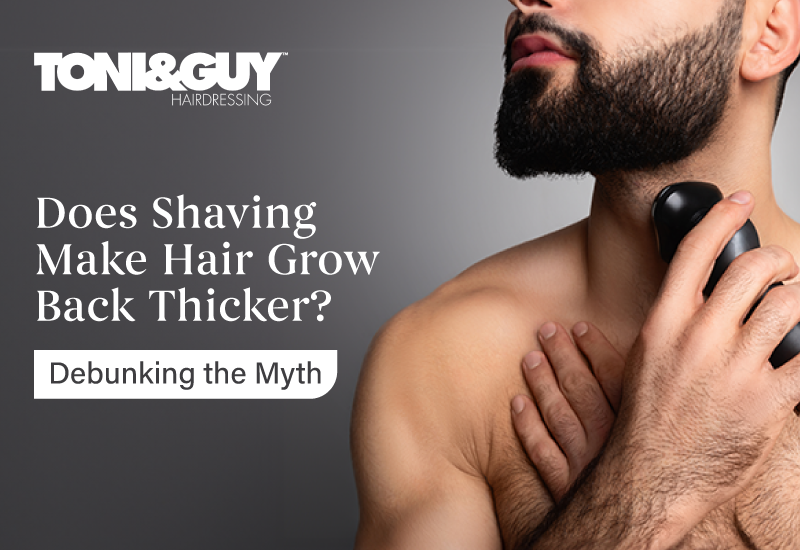
Introduction
Toni & Guy The quickest look: Does shaving cause hair to grow faster, thicker, or darker? But if I told you that it’s scientifically baseless? Cutting through this fog, we talk about the very root of the matter: why shaving does not alter your hair’s thickness or growth. Let us set things straight and break this myth once and for all!
You can check out our latest blog to learn more about Is Shaving Better than Trimming? Which is advisable
Origins Of The Shaving Hair Growth Myth
- Where Did It All Start?
The myth probably started with plain observation. Humans observed that their hair grew back darker and bristlier after shaving. Add that to a lack of scientific knowledge in the past, and tada—a myth was created. This misinformation has stuck mostly because of anecdotal evidence instead of medical truth.
- Misinterpretation Of Hair Texture After Shaving
Shaving hair causes it to grow harder and thicker when it comes back. Why? Shaving nicks the ends of the hair, giving them a sharp edge. The resulting stubble feels coarse and thick compared to the soft, tapered tips of unshaven, natural hair, creating the illusion of thickness and darkness.
What Science Says About Shaving And Hair Growth
- Shaving Does Not Impact Follicles
Hair originates from a root or a skin-based bulb. Shaving only slices hair outside of the skin, but does not touch the root or follicle. Thus, it cannot possibly affect the rate at which hair grows, its thickness, or colour.
- Dermatologists Weigh In
Several dermatologists and medical researchers have refuted the hair growth myth. One widely cited report from 1928 that appeared in the Journal of Investigative Dermatology concluded that men who shaved more often did not have an increase in hair thickness or growth rate. Contemporary dermatologists affirm this finding with the aid of advanced dermatological imaging and studies.
What Influences Hair Growth?
- Genetics Is The Real Boss
Your genes decide how thick, how coloured, and how textured your hair is.Your hair grows fast or is hugely thick due to your heredity and not your razor.
- Hormones Have A Role
Hormonal changes in puberty, pregnancy, and menopause affect hair growth, but shaving has absolutely nothing to do with it. For instance, testosterone causes face and body hair to grow in males, which shaving gets blamed for.
Common Misconceptions Regarding Shaving And Hair
Myth 1 – Shaving Accelerates Hair Growth
Truth: Shaving doesn’t have anything to do with the fast-growing of hair. Your follicles dictate how your hair grows, not how frequently you shave.
Myth 2 – Shaved Hair Gets Thicker
Truth: Stubble feels rough right after shaving because the hair ends are cut straight across. The natural taper comes back as it grows out.
Myth 3 – Shaving Darkens Hair
Truth: Hair looks darker after shaving due to its blunt edge and less sun exposure. The sun often lightens unshaven hair, making shaved hair seem darker in comparison.
Why These Myths Stick Around
- How It Looks And Feels
Shaving cuts off the soft, pointed tips of hair, leaving flat ends that feel thicker and look darker. You notice this that most in areas like legs or faces where hair thickens can change.
- Seeing What We Expect To See
When you think shaving causes hair to grow thicker, you’ll see new growth as evidence, even if it’s no different from before. This habit strengthens the false belief, making it tougher to disprove.
Hair Removal Techniques That Can Impact Growth
1. Laser Hair Removal
Laser treatments target hair follicles and can decrease hair growth as time passes, but they don’t make hair thicker.
2. Waxing And Epilation
These methods pull hair out by the root and might cause regrowth to look finer over time because they often damage the follicle.
3. Hair Growth Inhibitors
Some products you apply to your skin can slow down hair regrowth or make hair look thinner, but shaving doesn’t fall into this category.
Advice For Healthy Shaving
- Opt For A Sharp, Clean Razor
A dull razor can aggravate your skin and increase the likelihood of ingrown hairs, which can worsen the pain of subsequent growth.
- Hydrate With Moisturiser After Shaving
Well-hydrated skin helps new growth feel smoother and cuts down on irritation or redness.
- Shave In The Hair Growth Direction
This method reduces skin irritation and decreases the potential for razor burn or ingrown hairs.
What The Experts Recommend
- Prioritise Your Skin Care
Shave or don’t shave, do take proper care of your skin either way. Exfoliation periodically, moisturization, and layering on the sunscreen are your skin’s ultimate friends when it comes to sustaining that radiance.
- Pick The Right Hair Removal For You
There’s no universal solution here. Whether you prefer shaving, waxing, or laser treatments, pick the method that fits your lifestyle, skin type, and comfort level best.
Toni & Guy: Where Hair Science Meets Style
At Toni & Guy, we’re all about blending style with science. For years, we’ve been cutting through the myths to provide salon experiences rooted in real techniques and truths. We’re committed to hair care that delivers real results you can see and touch, whether that’s shaving tips or styling advice you Beard Get grooming tips directly from @toniandguysalon on Instagram.
Conclusion: Myth Dismissed, Truth Uncovered
One of the most insidious myths out there is the notion that shaving makes your hair grow faster, thicker, or darker. But guess what? It’s just a myth! Hair growth is regulated by genes and hormones, not the razor used to shave with. So shave on with confidence, knowing you’re not altering the essence of your hair—only its form. The shaving hair growth is finally put to rest, and it’s time to look beyond this old wives’ tale.
FAQS on The Shaving Hair Growth Myth
1. Is facial hair thicker after the act of shaving?
Nope! Shaving your facial hair doesn’t make it any thicker, or any faster to grow, or any darker in colour. It feels a bit scratchy due to the shave edge left on your skin after shaving, but these feelings are in your head.
2. What is the normal time period within which hair takes to regrow after shaving?
Hair generally grows back in a week or a couple of days. Of course, this depends on your body part and your hair growth cycle.
3. Which is better, waxing or shaving for thin regrowth?
Waxing makes your hair smooth for a long time because it pulls out hair from the roots, while shaving does not alter hair coarseness from the long-term point of view.
4. Why is the hair coarser after shaving?
The hair has a blunt edge when it has been shaved, so it feels coarse or stubbly in comparison to normally growing hair, which tapers to a fine point.
5. Can shaving cause skin problems?
Shaving does come with several dos and don’ts, and they may cause issues like razor burn, irritation, and the growth of ingrown hairs if violated. Proper technique and a properly cleaned razor are all it takes to eliminate those pesky complaints.


